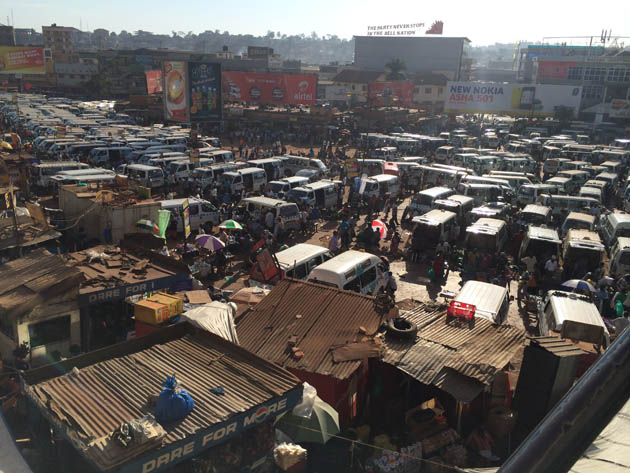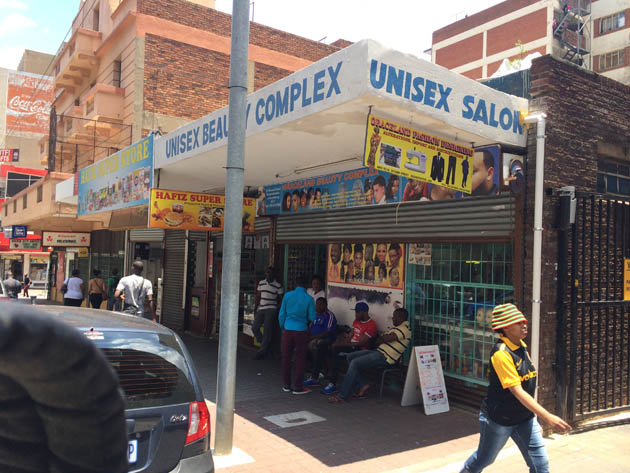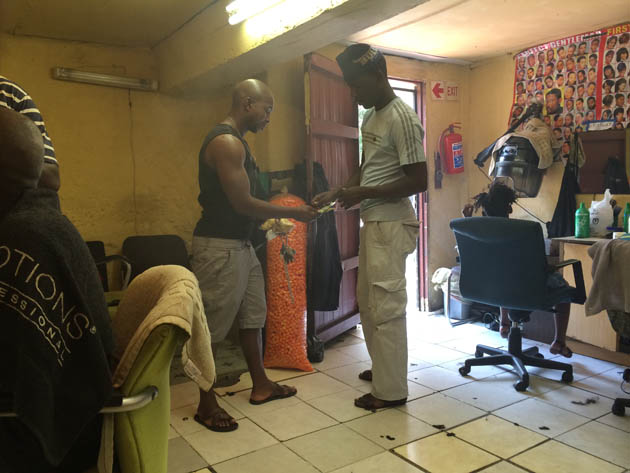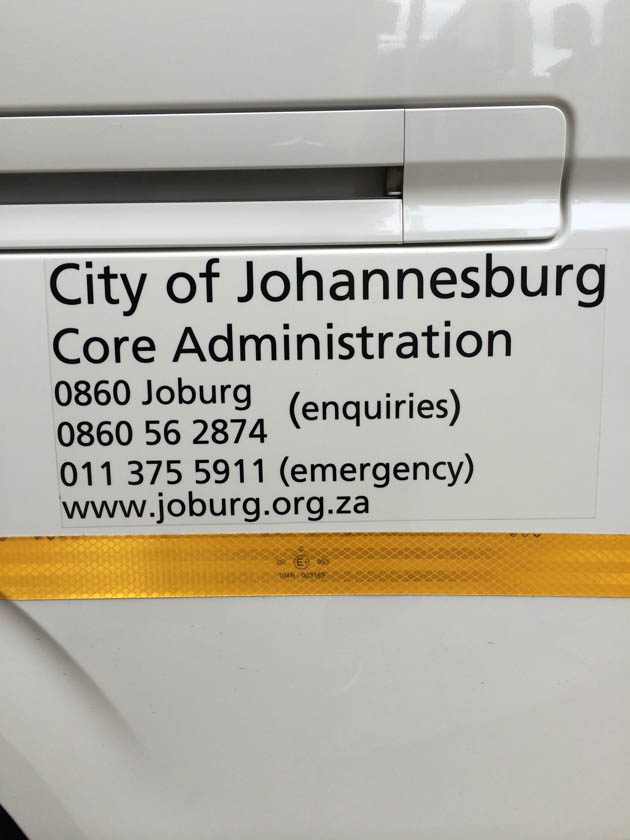On the 7th of December, I left London to travel through SubSaharan Africa for six week researching a play about barber shops. The project is supported by The Binks Trust, The British Council and Fuel Theatre Limited. This is the fourth of six journey-logs.
Barber Shop Chronicles / 27 December / Uganda
If I thought Kenyans were relaxed, they are absolute firecrackers-on-speed compared to the ever-at-your-own-leisure-ease Ugandans seem to stride with. Even the airport staff are so relaxed, I feel as though I'm queuing at a supermarket, casually checking myself into their country. My bag is the lone luggage on the conveyor belt, I grab it and head out searching for a taxi from Entebbe where the airport is, to Kampala, the capital city. My driver is a fast-talking uncle of crisp movements and quick eyes. I climb into the passenger seat and we are off. His name is Mugasa Blick and he tells me a little about how Swahili is used; only 30% of the country speak it compared to the 100% of Kenya, that there are various ethnic groups, so various languages, but the most commonly spoken is English. We drive past shops entirely painted and decorated with the logos and colours of rival mobile phone companies - Airtel and MTN, red and yellow respectively - aggressively advertising in a country where I imagine aggression doesn't work.
I check into the Shangri-La hotel, leave an hour later to explore my neighbourhood. The hotel is tucked just behind the Sheraton, a ground-hugging-sprawling bungalow compared to the multi-storey sparkling tower of the Sheraton Hotel, rising up from this hill, one of the seven Kampala is built on. The public modes of transports are the Matatus (buses similar Kenya's) and Bodabodas - unlicensed motorbikes that dart in and out of traffic, by far the fastest way to travel. I hop on a boda and ride to the Nakumat, (local shopping mall) to purchase an MTN SIM card. The mall is three stories tall and is busy for a lazy Sunday afternoon. Kids ride up and down the escalators as if in an amusement park, laughing at the sensation of moving whilst standing still. I eat at a food court, letting the warmth of early evening slow down my racing thoughts on what to do tomorrow.
Monday, 30th of December and I meet Patricia who works for the British Council in Kampala and she further contextualises Uganda's relationship with the English language. She says that during the Liberation War between Uganda and Tanzania, the leader at the time, Idi Amin, was distrustful of Ugandans who held positions in the government, who'd completed their education in England and spoke English far batter and fluently than he did. He deposed a lot of them, gave their jobs to those he trusted and insisted they carry out the duties of their office in Swahili. They were brutal times and after the war Swahili became synonymous with hard time and the military. The people refused to have their everyday conversation overshadowed by those difficult times and wanted another national language. To avoid the problems that may arise from favouring a local tribal language over others, English was settled on. I explain the barber shop project again to Patricia, where it began, what it is trying to do and the experience thus far. She suggests a bunch of places to check out, a strategy, a plan of action and insists that I visit Alex, a friend of hers who runs an arts organisation. We drive for a few minutes and the landscape changes from the presidential and business side where I am based, to the packed pedestrian of the city centre, and eventually, the partially rural ‘roaming-goats’ working class side of town.
Alex is direct, intelligent and hardworking, you can tell by how he talks, how, as I explain the project again, I feel like he is underlining lines and phrases from the play's sales pitch. He leans back and says that I need to stay away from affluent barber shops, that I must go to other places for local conversations, everyday problems. He says they will not be kind to a foreigner recording their talk, so I must do it discretely. There will be langue-barrier he says, people gossip in their dialects not in English. He suggests hiring an interpreter for the day: Jackson, a friend, playwright and actor, who everyone knows as 'Dre', "Like the doctor" Alex says laughing. Dre is an easy going, softly spoken, loose-limbed starving artist like I am and I find camaraderie and kinship in his views on Nigerian literature and the implications of being an "African Writer".
The following day we travel by foot and matuatu to three barber shops. Dre explains that the largest tribe is called Buganda from which the country gets its name: Uganda, Baganda is the plural for Muganda (what you call a lone Bugandan) and Luganda is their language, which Dre speaks in the barber shops, doing his best to initiate conversations. I discretely push the record button on my device and try to guess what is being talked about, I watch the familiar dance of testosterone and intimacy/bravado and humility/storyteller and his audience play out in a different tongue. After the third barber, Dre and I sit and he translates. With a sinking feeling, it becomes obvious that this arrangement is not working. I have never recorded without asking for permission first. As Dre speaks, I realise I need to be more active. If I could understand what was being said, I would have asked this question at this point, agreed here, disagreed there, teased this topic out because someone else had spoken of it in London or Johannesburg... and a host of other things I had been doing automatically, before pressing the record button. I thank Dre for his time and resolve to find another shop where English is the language of gossip. Michael (from Kenya) had paired me with a lady called Beverly, a friend, fellow poet and member of Kampala's literati. Beverly gives me the number of a barber called Simon based in the Ntinda shopping complex in Bugolobi and later in the evening, I wrestle the price from 7,000 shilling to 5,000, hop on the boda and we weave through the red tinged-world that is the sun setting on Kampala. The journey takes a little over 15 minutes and from the moment I walk into the beauty salon where Simon rents a chair and works from, it is non-stop with talk. Simon is a diamond of a barber of a man. He has been cutting for 15 years, his clients go back a decade and they trust him so much, after he explains my project and I ask hesitantly if I can record our conversation, one says 'I don't give a fuck' and another looks at the recording device as though an insect before the unstoppable locomotive force of his opinion on the ills of the world. He talks about love. In a rich thick accent, he lectures passionately and wildly on the dangers of loving too much. I don't ask who hurt him in the past, he tells everything unprompted. Another client discusses surprisingly contemporary attitudes to dating, to Uganda's dowry system, to fatherhood and when they ask about my own marital status, they collectively chastise me on being single, how unusual it is (they say) for a Nigerian not have two or even three girlfriends at at time. Back at the hotel, I fall to sleep listening to the conversation and dream I have two girlfriends. I wake up sweating from the stress of it.
It is the early hours of the 31st of December, new year's eve and a sudden loneliness is a gulp in my throat. I spend most of the day writing, half planning to mark the year's end from the comfort of my bed, but eventually, I go out to meet Phiona Okumu, writer, journalist, curator, country-hopper, enthusiast; an everything woman. Above all, she is an old friend and we see in the new year together. The first day of 2014 passes uneventfully, I write for all of it and on Friday, head out to meet Simon for the last time. We leave the mall in Ntinda, take the first two left turns and enter a health centre. There is a pool table by the pool side. The soundtrack to the music of striking cue sticks, is child's play, laughter and splashing water. Now and then, a daughter runs to us from the pool to high five her father, who is among us, before diving back into the water. Simon buys a round of drinks for everyone and I'm drawn against an experienced player, smooth and precise to the clumsy ogre that is my style of play. We play three rounds, he takes the first match when I have two reds left to pot. Miraculously, I take the second, and he absolutely destroys me in the third. As we play, Simon explains that he had been working since 6am that morning, he'd driven to a client's house before coming to the mall, that it had been non-stop. I ask if he will ever open his own barber shop, he says he has been saving for it already and also plans to open a shop for his girlfriend. Simon knows his business well, he discuss work incentives for future employees, ways of generating positive attitudes to life for the mental well-being of clients, how to sustain longevity and the best location for his business. After the match, I thank Simon for his time, for allowing me into his world and flag down a boda to take me back to hotel. It is night time and the driver dodges potholes and speed bumps so smoothly, I drift off on motorbike and imagine a thriller set within Kampala's bodaboda community - think Spartacus meets Biker Boyz meets West Side Story with an oracle figure loosely based on Simon.
Whereas the South Africans mostly spoke on politics, Zimbabweans mostly on music and Kenyans on African development, the Ugandans overwhelming spoke of love. As if to confirm this, behind the breakfast buffet table, Jimmy, who works at the hotel, tells me about his last relationship. He walked in on his girlfriend cheating on him. He recounts a joke by the Nigerian comedian Basktemouth. Basketmouth explained how Hollywood had colonised our ideas of relationships; in movies, you have guys climbing mountains, threatening to jump from heartbreak and it turns out okay in the end, but in Africa, you'll jump and die! Hollywood romances he says, should come with the same warning that precedes WWA (World Wrestling Allstars) t.v. shows: 'Don't try this at home'. We swap email address, promise to keep in-touch, and after packing, I make a list things I have learnt:
1) Storks are common as muck in Uganda. 2) Kenyans believe Ugandan girls are aggressive. 3) Swahili is regarded as the language of the military. 4) The bodabodas are the bad boys of traffic. 5) Ugandan soil is very very red. 6) The dowry culture is still thriving. 7) The source of the River Nile is in Uganda. 8) There are 56 tribes in Uganda. 9) The largest tribe in Africa are Manchester United fans. 10) I am a superficial tribesman.
Next stop, Lagos, Nigeria.




















































